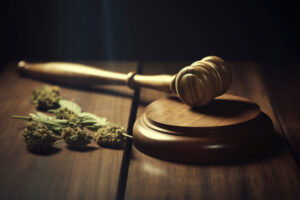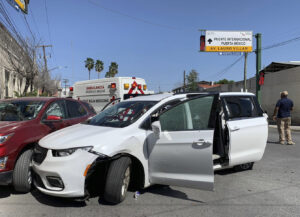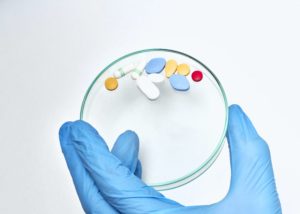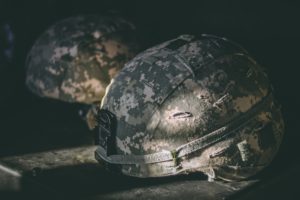The Few, the Proud…the Microdosed?
In recent years, active-duty Marines have taken an apparent interest in using LSD. U.S. Marines salute during the national anthem before an NFL football game between the Chicago Bears and the Detroit Lions Sunday, Nov. 13, 2022, in Chicago. (AP Photo/Charles Rex Arbogast)
This is Part of the "The Ecstasy of Agony" Dig series
U.S. Marines salute during the national anthem before an NFL football game between the Chicago Bears and the Detroit Lions Sunday, Nov. 13, 2022, in Chicago. (AP Photo/Charles Rex Arbogast)
This is Part of the "The Ecstasy of Agony" Dig series
In recent years, active-duty Marines have taken an apparent interest in using LSD.
“We have a drug problem in the 2nd Marine Division,” Maj. Gen. Francis L. Donovan said in a 2020 press release. That year, the 2nd Marine Division issued a “no tolerance” policy on LSD use in response to apparent outsized use of the drug. The division reportedly performed over 4,000 LSD tests over the summer of 2020 and encouraged service members to report any knowledge of LSD use to their superiors.
In November of 2021, Marines possessing LSD again made headlines. A Marine stationed at Camp Kinser in Japan was found in possession of LSD and threatened with a year of prison overseas and hard labor. In court, this Marine stated that he was recommended to take LSD by another “military friend” from the 3rd Marine Logistics Group. Ultimately, the Marine pleaded guilty and had his sentence suspended for three years, meaning that if he commits another offense in Japan during that time, he must serve the 12-month sentence.
But perhaps the most consequential link between the psychedelic and the Marines is a 2019 paper by Maj. Emre Albayrak (now a lieutenant colonel) that serves as a glowing endorsement on the potential of Marines microdosing LSD.
Leaving aside the questions this raises regarding the controversial decision of psychedelic advocates to prioritize veterans and the military as a political strategy, much of Albayrak’s arguments in favor of microdosing are based on questionable claims and research.
Published in the Marine Corps Gazette, a professional journal for U.S. Marines, Albayrak’s report notes that Marines are already using a number of performance-enhancing drugs (PED) — including caffeine, tobacco, amphetamine, ritalin and “non-Food and Drug Administration-approved pre-workout supplements.” In his opinion, active-duty Marine Corps Intelligence, Surveillance and Reconnaissance Enterprise (MCISRE) members could get a leg up on the enemy by taking microdoses of LSD.
“War is not a game, and meeting your enemy on equal footing is a fool’s errand,” Albayrak wrote. “This is a serious foray and discussion about considering the use of cognitive PEDs to increase productivity, creativity, problem-solving ability and flow. If such an experiment were initiated and found to provide a cognitive edge, the DOD and MCISRE, in concert with the data aggregation tool and other technological advantages available, would leverage an untapped resource to create an insurmountable gap over every other competitor.”
In his report — which ultimately suggests a government study to determine “if significant gains could be made in intelligence analysis productivity and efficiency” through microdosing — Albayrak relies on claims that microdosing LSD has been proven to enhance creativity and that the method works by decreasing activity in the “default mode network” (DMN) of the brain.
These claims have been contested and problematized by researchers in the psychedelic field.
Claim #1: “In research, microdoses were reported to significantly heighten alertness, creativity and problem-solving — inducing a ‘flow state’ that aids in lateral thinking.”
This claim is not unique to Albayrak and similar claims have been made by pop psychology authors, Silicon Valley CEOs, and biohackers for decades. But this assertion falters when held up to scientific scrutiny.
The largest placebo-controlled trial on the subject concluded that microdosing either a psychedelic or a placebo for cognitive enhancement provided the same benefits.
Summarizing this study for The Guardian, writer Ian Sample wrote that researchers “found that small doses of LSD indeed boosted the psychology in all manner of ways…[But] when the researchers examined what trial volunteers took, they found placebos worked equally as well as the drug.”
The study’s lead author, Balázs Szigeti, said that “this suggests that the improvements may not be due to the pharmacological action of the drug but can instead be explained by the placebo effect.”
On a 2019 episode of the “Angry Planet” podcast where Albayrak discussed the study he would like to see comparing service members who microdose to those who do not, he explicitly stated that he did not want to include a placebo group because he “didn’t want to complicate the study.” In his opinion, it would be “absolutely sufficient to have two groups — one microdosing, one not.”
Considering the academic evidence that placebos appear just as effective as psychedelic microdoses, this proposed study design now seems less than sufficient.
Claim #2: “[A study carried out by researchers at Imperial College London] states that LSD decreased blood flow to the “default mode network” (DMN), an area of the brain that is activated when the mind is wandering, not committed to a task and thinking about one’s emotional state — what is generally viewed as the ‘ego.’ A person’s problem-solving ability is typically constrained by his ability to think beyond his limited set of experiences housed within the DMN… As psychedelics decrease DMN activation, individuals have been shown to expand their ability to connect seemingly unconnected pieces of information and create revolutionary new solutions.”
That psychedelics like LSD may decrease DMN activity is not a disputed fact among researchers. Brain imaging studies have shown these results to likely be true. However, there are two major issues with Albayrak’s assertion that, because of a decrease in DMN activity, microdosing LSD can enhance cognition.
The first issue with Albayrak’s claim is that the research he cites was not studying microdoses at all. The research, written about in the cited paper “Neural Correlates of the LSD Experience Revealed by Multimodal Neuroimaging,” compared a placebo group to a group of participants who received 75 micrograms of LSD. A microdose of LSD typically weighs between six and 20 micrograms.
The second issue with the claim that decreased activation of the DMN increases problem solving abilities and enhances performance is that other drugs — which are not typically considered PEDs — have this same effect. Manoj Doss, a cognitive neuropsychopharmacologist and post-doctoral research fellow at Johns Hopkins University, has been vocal about his skepticism of claims around psychedelics and the DMN. In an interview with The Microdose, Doss said that other areas of the brain, like sensory regions, are actually more affected than the DMN by LSD.
“But also, every drug affects the DMN,” Doss said. “I wrote in a paper about Salvia that the strongest and most statistically significant results we got in increases or decreases of functional connectivity were decreases in the DMN. Other researchers have shown this with alcohol, too — but alcohol doesn’t dissolve your ego, it makes you more egotistical!”
Claim #3: “The enhanced availability of cognitive pathways, in addition to the changes in cortical functions brought on by microdosing, enhances lateral thinking and creativity, both of which are critical for problem-solving and analytical thinking.”
Here, Albayrak fuses both of the claims disputed above to assert that because of decreased activation of the DMN, more cognitive pathways are available. He believes that this results in enhanced lateral thinking and creativity.
This claim should already be read as dubious based on the commentary above. But there’s a cherry atop Albayrak’s bungled argument: the 2016 paper he cites as evidence — “The Associations of Naturalistic Classic Psychedelic Use, Mystical Experience, and Creative Problem Solving” — specifically notes a lack of evidence to make claims about microdosing.
“Recent media attention has been paid to the purported link between classic psychedelics and creativity,” it states. “However, there is currently no empirical data regarding microdosing.”
Your support matters…Independent journalism is under threat and overshadowed by heavily funded mainstream media.
You can help level the playing field. Become a member.
Your tax-deductible contribution keeps us digging beneath the headlines to give you thought-provoking, investigative reporting and analysis that unearths what's really happening- without compromise.
Give today to support our courageous, independent journalists.






You need to be a supporter to comment.
There are currently no responses to this article.
Be the first to respond.